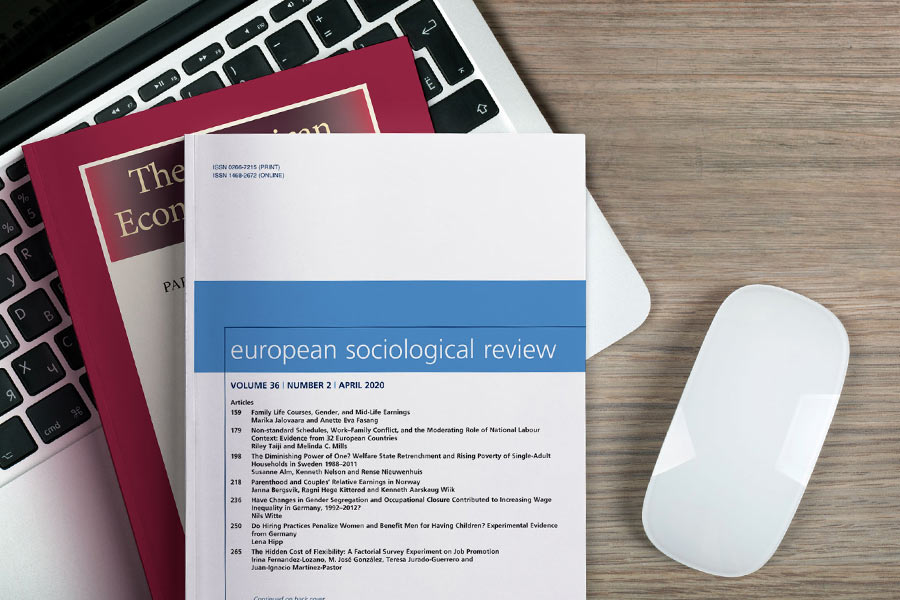Total hits 17.327
-
Angebot und Bedarf an hochqualifizierten Arbeitskräften bis 1980. Darstellung der unter Leitung von L. Alex und H.-P. Widmaier erstellten Studien. Teil 1: Überblick üd Methoden
Müller, H. & Tessaring, M. (1973): Angebot und Bedarf an hochqualifizierten Arbeitskräften bis 1980. Darstellung der unter Leitung von L. Alex und H.-P. Widmaier erstellten Studien. Teil 1: Überblick üd Methoden. In: Materialien aus der Arbeitsmarkt- und Berufsforschung, Vol. 4, No. 5, p. 1-14.
-
Arbeitsmarktstatistische Zahlen in Zeitreihenform. Jahreszahlen für die Bundesrepublik Deutschland (Ausgabe 1973)
Leupoldt, R. & Ermann, K. (1973): Arbeitsmarktstatistische Zahlen in Zeitreihenform. Jahreszahlen für die Bundesrepublik Deutschland (Ausgabe 1973). (Beiträge zur Arbeitsmarkt- und Berufsforschung 03.1), Nürnberg, 240 p.
-
Substitutionspotentiale bei Ausbildungsberufen (Lehrberufen) nach dem Urteil der Vorgesetzten
Hofbauer, H. & König, P. (1972): Substitutionspotentiale bei Ausbildungsberufen (Lehrberufen) nach dem Urteil der Vorgesetzten. In: Mitteilungen aus der Arbeitsmarkt- und Berufsforschung, Vol. 5, No. 2, p. 77-94.
-
Die berufliche Fortbildung männlicher Erwerbspersonen. Teil 2: Fortbildung, Arbeitssituation und Mobilität
Brinkmann, C., Gottwald, K. & Schuster, L. (1972): Die berufliche Fortbildung männlicher Erwerbspersonen. Teil 2: Fortbildung, Arbeitssituation und Mobilität. In: Mitteilungen aus der Arbeitsmarkt- und Berufsforschung, Vol. 5, No. 2, p. 95-130.
-
Die Bundesrepublik Deutschland als Beschäftigungsland für ausländische Arbeitnehmer
Peters, A. (1972): Die Bundesrepublik Deutschland als Beschäftigungsland für ausländische Arbeitnehmer. Ökonomische Attraktivität, rechtliche Situation und politische Mitwirkung. In: Mitteilungen aus der Arbeitsmarkt- und Berufsforschung, Vol. 5, No. 4, p. 307-328.
-
Permanent Education. A Compendium of Studies Commissioned by the Council for Cultural Co-Operation. A Contribution to the United Nations' International Education Year.
(1972): Weiterbildung. Eine Synopse aus 15 im Auftrag des Europarats erarbeiteten Studien. In: Mitteilungen aus der Arbeitsmarkt- und Berufsforschung, Vol. 5, No. 4, p. 329-372.
-
Zur Produktivitätsprognose mit Hilfe von intrasektoralen Analogieschlüssen
Egle, F., Klauder, W. & Thon, M. (1972): Zur Produktivitätsprognose mit Hilfe von intrasektoralen Analogieschlüssen. In: Mitteilungen aus der Arbeitsmarkt- und Berufsforschung, Vol. 5, No. 4, p. 285-306.
-
Arbeitsmarkt- und Bildungsforschung in Österreich
Reisinger, L. (1972): Arbeitsmarkt- und Bildungsforschung in Österreich. In: Mitteilungen aus der Arbeitsmarkt- und Berufsforschung, Vol. 5, No. 2, p. 147-156.
-
Zur Entwicklung des Arbeitsmarktes in der Bundesrepublik Deutschland im Jahre 1972
Kühl, J., Reyher, L. & Riefers, R. (1972): Zur Entwicklung des Arbeitsmarktes in der Bundesrepublik Deutschland im Jahre 1972. In: Mitteilungen aus der Arbeitsmarkt- und Berufsforschung, Vol. 5, No. 2, p. 131-135.
-
Tätigkeitsschwerpunkt als Strukturmerkmal in der Erwerbsstatistik
Chaberny, A., Fenger, H. & Reiter, A. (1972): Tätigkeitsschwerpunkt als Strukturmerkmal in der Erwerbsstatistik. In: Mitteilungen aus der Arbeitsmarkt- und Berufsforschung, Vol. 5, No. 3, p. 230-257.
-
Saisonale und konjunkturelle Einflüsse auf die Arbeitslosigkeit in den einzelnen Berufsgruppen
Karr, W. & König, I. (1972): Saisonale und konjunkturelle Einflüsse auf die Arbeitslosigkeit in den einzelnen Berufsgruppen. In: Mitteilungen aus der Arbeitsmarkt- und Berufsforschung, Vol. 5, No. 3, p. 258-275.
-
Das französische Studien- und Forschungszentrum für Qualifikationen. Die Erforschung der Verwertung und Entwicklung beruflicher Qualifikationen. Institutionelle und methodische Aspekte
Ducray, G. (1972): Das französische Studien- und Forschungszentrum für Qualifikationen. Die Erforschung der Verwertung und Entwicklung beruflicher Qualifikationen. Institutionelle und methodische Aspekte. In: Mitteilungen aus der Arbeitsmarkt- und Berufsforschung, Vol. 5, No. 2, p. 136-146.
-
Die berufliche Fortbildung männlicher Erwerbspersonen. Teil 1 (Aus der Untersuchung des IAB über Berufsverläufe bei männlichen Erwerbspersonen). .
Brinkmann, C., Gottwald, K. & Schuster, L. (1972): Die berufliche Fortbildung männlicher Erwerbspersonen. Teil 1 (Aus der Untersuchung des IAB über Berufsverläufe bei männlichen Erwerbspersonen). . In: Mitteilungen aus der Arbeitsmarkt- und Berufsforschung, Vol. 5, No. 1, p. 1-30.
-
Auswirkungen technischer Änderungen auf Arbeitskräfte. Bericht über Methode und erste Ergebnisse einer Erhebung in der kunststoffverarbeitenden Industrie.
Ulrich, E., Lahner, M. & Köstner, K. (1972): Auswirkungen technischer Änderungen auf Arbeitskräfte. Bericht über Methode und erste Ergebnisse einer Erhebung in der kunststoffverarbeitenden Industrie. In: Mitteilungen aus der Arbeitsmarkt- und Berufsforschung, Vol. 5, No. 1, p. 31-67.
-
Zur Beschäftigungs- und Ausbildungssituation in Indien. Ein statistischer Überblick mit besonderer Berücksichtigung der Arbeitskräfteprobleme auf der Facharbeiterebene
Fenger, H. & Werner, H. (1972): Zur Beschäftigungs- und Ausbildungssituation in Indien. Ein statistischer Überblick mit besonderer Berücksichtigung der Arbeitskräfteprobleme auf der Facharbeiterebene. In: Mitteilungen aus der Arbeitsmarkt- und Berufsforschung, Vol. 5, No. 2, p. 162-187.
-
Arbeitsmarktbeobachtung und Beschäftigungsprojektion in Japan
Mizuno, Y. (1972): Arbeitsmarktbeobachtung und Beschäftigungsprojektion in Japan. In: Mitteilungen aus der Arbeitsmarkt- und Berufsforschung, Vol. 5, No. 2, p. 157-161.
-
Die funktionsorientierte Bestimmung von Tätigkeitsinhalten
Luxem, E. (1972): Die funktionsorientierte Bestimmung von Tätigkeitsinhalten. In: Mitteilungen aus der Arbeitsmarkt- und Berufsforschung, Vol. 5, No. 3, p. 226-229.
-
Materialien zur Statusmobilität bei männlichen Erwerbspersonen in der Bundesrepublik Deutschland
Hofbauer, H. & Kraft, H. (1972): Materialien zur Statusmobilität bei männlichen Erwerbspersonen in der Bundesrepublik Deutschland. In: Mitteilungen aus der Arbeitsmarkt- und Berufsforschung, Vol. 5, No. 3, p. 199-225.
-
Die Werkzeugmacher. Berufsentwicklung nach den Volks- und Berufszählungen 1950, 1961 und weiteren statistischen Unterlagen.
Otto, M. (1972): Die Werkzeugmacher. Berufsentwicklung nach den Volks- und Berufszählungen 1950, 1961 und weiteren statistischen Unterlagen. In: Materialien aus der Arbeitsmarkt- und Berufsforschung, Vol. 3, No. 25, p. 1-12.
-
Auswirkungen technischer Änderungen. Teil 3: Die Kunststoffverarbeitende Industrie. Ergebnisse der repräsentativen Erhebung des IAB (Projekt 5-44) über die Auswirkungen technischer Änderungen auf Arbeitskräfte und Arbeitsplätze nach Industriezweigen, Betriebsgrößen und regionaler Verteilung
Lahner, M. & Mehnert, K. (1972): Auswirkungen technischer Änderungen. Teil 3: Die Kunststoffverarbeitende Industrie. Ergebnisse der repräsentativen Erhebung des IAB (Projekt 5-44) über die Auswirkungen technischer Änderungen auf Arbeitskräfte und Arbeitsplätze nach Industriezweigen, Betriebsgrößen und regionaler Verteilung. In: Materialien aus der Arbeitsmarkt- und Berufsforschung, Vol. 3, No. 22, p. 1-8.



